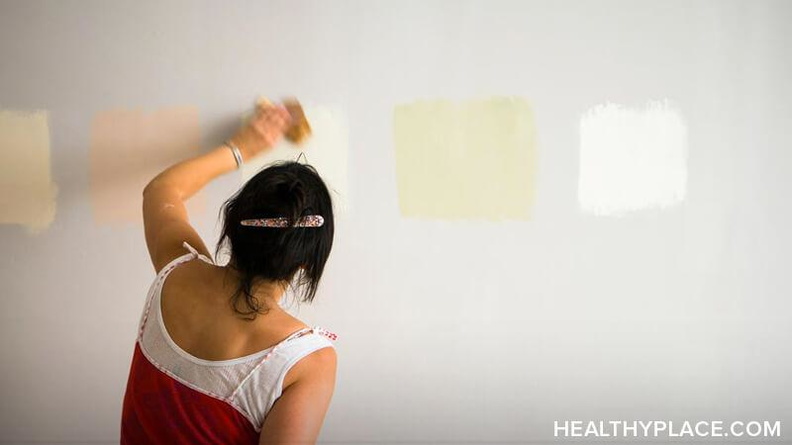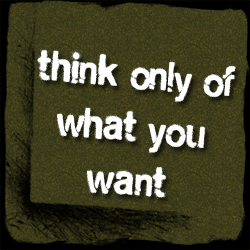Heal From Abuse: Decide What You Want Not What You Don't Want

If you have read about domestic violence, then know that healing from abuse can be as difficult as living in it. You've read that leaving abusive relationships is not easy and can be downright dangerous. You read about the cycle of abuse and the power and control wheel. You've also come to understand that whether you believe you are abused or if you continue to question if your partner abuses you, your relationship is not a healthy one. Hopefully, at the very least, you realize the problem in your relationship cannot be entirely your fault (relationships take two, you know) and your mental disorders or problems like codependency explain only a fraction of the story.
While these realizations and your understanding of abuse can help you to cope with the ugliness surrounding you, nothing you can learn about being abused will help you to feel better. Knowing you're abused, to any degree, can cause you to feel hopeless, helpless, undeserving, and stuck. Domestic violence agencies, online message boards, and blogs give you an opportunity to communicate with others who understand and can validate your experience.
From Validation to Healing From Abuse
When you feel validated, you feel that your experience is truthful and real. Your abuser will never validate your experience because they are too busy trying to convince you that you are not abused. Other people can validate your experience and, more importantly, you can validate your own experience.
However, after experiencing abuse, you may not believe yourself as you once did. You probably doubt your perceptions and wonder if you're making too much of your problems. Therefore, the best feeling type of validation you'll initially experience when coming out of isolation is to hear other abuse victims or victims' advocates say "I believe you" or "The same thing happened to me." Later, after you've moved into the healing stage, you will learn to validate yourself.
 In fact, at some point you must move beyond the comforting satisfaction of others' validation into the confusion of how to deal and heal from your abusive relationship. If you seek or require the validation of others for too long, you run the risk of forming a victim mentality. Do you want to be a perpetual victim? No. Do you know how to heal? Perhaps not. But don't worry, you are not alone in learning how to heal from abuse.
In fact, at some point you must move beyond the comforting satisfaction of others' validation into the confusion of how to deal and heal from your abusive relationship. If you seek or require the validation of others for too long, you run the risk of forming a victim mentality. Do you want to be a perpetual victim? No. Do you know how to heal? Perhaps not. But don't worry, you are not alone in learning how to heal from abuse.
Healing from abuse is a process of trial and error because what works for another person may not work for you. However, you won't know if any how-to-heal suggestion works for you until you to try it.
Heal From Abuse A Bit Now
Answer the Question "What Do I Want?"
Deciding what you want in your relationships instead of identifying what you do not want is one way to deal with and heal from abuse. Answering the question "What do I want?" may not be a simple task. Remember that you've put what your abuser (and other people) want over your own wants for quite some time. Although you may set and achieve professional or other types of goals, the one place abuse victims struggle revolves around relationships, especially love relationships.
Some of us abuse victims have a list of what we do not want based on what our abusive partner did or does. Giving up this list can be tough because I, for one, thought destroying that list would allow me to forget what my abuser did to me. But, if I forgot, then I might make the mistakes again. The problem with keeping lists of what we don't want is that when we re-read them, we re-traumatize ourselves with the memories.
But if you re-read lists of what you do want, then you will re-dedicate yourself to your goal of healthful living. Here is a sample list of my desires based on what my abuser did but reworded with becoming healthy in mind. Which type of thinking makes you feel more positive?
- "I do not want my partner to ignore my needs." changes to "My partner attends to my needs respectfully when I express them."
- "I do not want my partner to verbally abuse my children." changes to "My partner exhibits only love and caring toward my children."
- "I do not want my partner to hit me." changes to "My partner expresses negative emotions in a way that invites me to open up, be truthful and empathize."
If you do not have a list of what you don't want to help you determine what you do want, then think on statements like these:
- My partner believes that I am faithful.
- My partner thinks it is good for me to hang out with my friends.
- My partner supports my personal and professional goals.
Spend a few minutes now compiling your list of what you want in a love relationship. Go ahead, take one step toward a healthier life. If making this list does not make you feel better, then try another healing activity later today. The point is to try various ways to heal. There is no downside to trying. No healthful activity will leave you weaker; but some may make you stronger than others.
You can also find Kellie on her website, Google+, Facebook and Twitter.
*Both women and men could be abusers or victims, so please do not take my pronoun choice as an implication that one gender abuses and the other is victimized.
APA Reference
Jo, K.
(2015, January 12). Heal From Abuse: Decide What You Want Not What You Don't Want, HealthyPlace. Retrieved
on 2025, December 6 from https://www.healthyplace.com/blogs/verbalabuseinrelationships/2015/01/healing-from-abuse-decide-what-you-want
Author: Kellie Jo Holly
For the majority of women (or men), it's a hard decision.....but you were put here on earth for a reason. You will find yourself if you only free yourself.
http://fromwednesdaysheart.blogspot.com/2015/05/thank-god-for-release.html
If the above doesn't work, can you suggest other alternatives? Can't help feeling helpless and hopeless and dunno where or who to turn to.
Its incredible to read this blog, as if someone is telling my story... I have spent the last 17 years in abusive relationships ( 3 to be exact). I tricked myself into thinking therapy worked, but today realize that I went from relationships that started with verbal abuse, physical and verbal abuse, to downright psychotic behaviour... What is most discouraging is realizing how low I've gotten in my choice of partners because clearly I do not know anything else... I know I am on the way to healing. Everything you say, from the erasement, to the denial, to the energy spent living in a fantasy to cope, and putting everyone's needs aside to allow the abusor to remain above everyone, resonates in a way I wish it didn't and yet is oddly comforting all the same.
Thank you for this candid and very very poignant blog...
